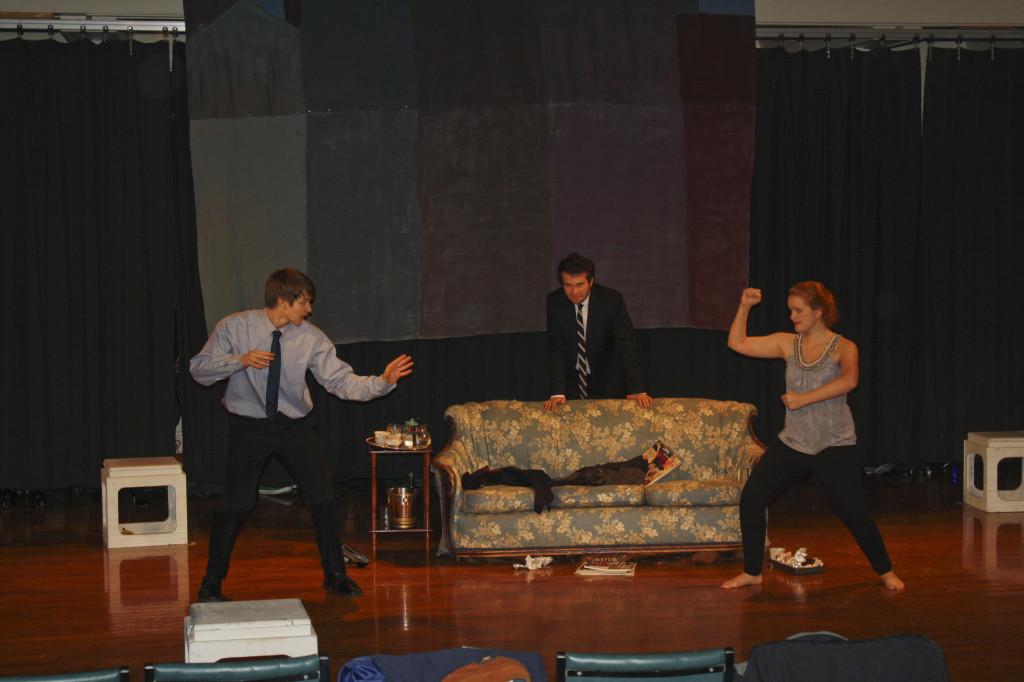Company Delights and Impresses with Songs of the Heart
College first-year Hank Miller (left) and Conservatory junior Kaitlin Loeb share a moment in a scene from OSTA’s production of Stephen Sondheim’s Company. The show’s superb casting and darkly humorous musical numbers made for a truly enjoyable experience.
November 22, 2013
People love to talk about love, and as far as Stephen Sondheim is concerned, people love to sing about it, too. This conviction was on full display in the Oberlin Student Theatre Association’s production of his musical Company, which ran in Wilder Main from Thursday to Saturday last week. OSTA’s Company was a clean, stylish show that stayed faithful to the original without seeming derivative, thanks to excellent performances executed with vigor and enthusiasm. While the lack of microphones made dialogue and lyrics often difficult to decipher, the verve of the production overcame that considerable setback, rendering this version of the classic musical a pronounced success.
Company revolves around the character of Robert — played with appropriate charm and everyman appeal by College first-year Hank Miller — and his relationship to his own bachelorhood as influenced by his encounters with the couples with which he has surrounded himself. The original book, by George Furth, is well-written, but the show’s best moments come from the combination of Stephen Sondheim’s characteristically idiosyncratic music and clever lyrics.
The musical is presented as a series of short vignettes, tied together by the indecisive Robert at his thirty-fifth birthday party. Robert spends time with his various coupled friends, punctuated by songs on the topic of — what else? — love and commitment, before eventually reaching a decision about the direction of his romantic life going forward. The plot, to say the least, is unconventionally non-linear and sometimes seems unfocused. However, the plot is really not the point.
Instead, the draw of Company is the music and, in the case of OSTA’s production, the consistently excellent performances coached by director and College sophomore Robert Bonfiglio. Standout performers included Miller in the role of Robert, and College first-year Zoë DePreta, who played the neurotic Amy — one of Robert’s coupled friends — in the Saturday night showing. She exuded a frantic, brittle energy and more than carried her weight in the difficult, riveting number “Getting Married Today.”
While every other performance was also robust, of particular note were Robert’s sweet, uptight friend Jenny — played by double degree first-year Elana Bell on Saturday night — and his weird but poignant romantic interest, flight attendant April, played by Conservatory junior Kaitlin Loeb. At times, in fact, Company seemed like a showcase of excellent female performances; while the male performers were certainly strong, they largely seemed like supporting cast for the uniformly fabulous bevy of wives, fiancées and girlfriends that tethered the show.
The additional tether of the production lay in the musical numbers. The darkly funny “Poor Baby” and “Barcelona” contributed the professional caliber of the show, while the finale “Being Alive,” sung movingly by Miller, allowed the show to come out with a sweet, nuanced affirmation of love before the rather abrupt end of the show. If the ending seemed abrupt, however, it was a feature of the musical itself and not this production. As Amy tells Robert when she rejects his marriage proposal, “You need to marry somebody, not some body,” but Robert ends the show strangely opposed to this, with an urge to marry but without any particular woman in mind.
Aside from the idiosyncrasies of the musical itself, this production was unusually good. The main issue, however, was a big one. The lack of microphones combined with the unwieldy venue rendered many lines completely indecipherable, which undermined the viewing experience considerably. The unavoidable murmuring of the packed house and the volume of the otherwise-excellent accompanying musicians only exacerbated the problem. While it was not enough to ruin the show, it did diminish one of its best features.
Fortunately, the superb quality of the other elements was enough to overcome that obstacle. OSTA’s production of Company was polished and attractive from beginning to end, an example of what happens when talented directing meets talented acting and singing meets talented set design, musicianship and costuming. The cast may have been singing about love, but there was nothing trite about it. On the contrary — they put on a complex, nuanced production that does justice to the original.





















